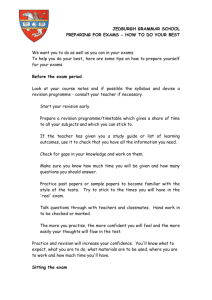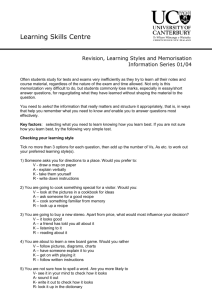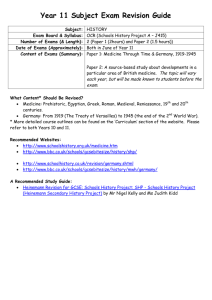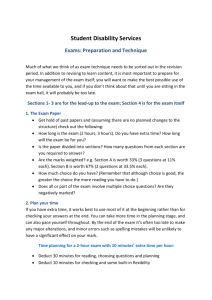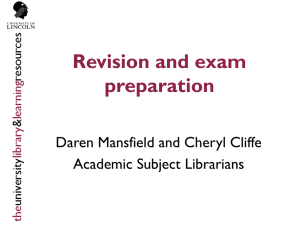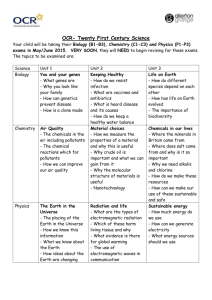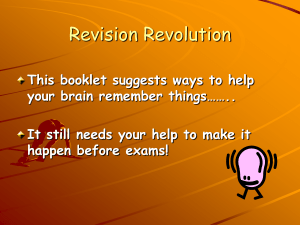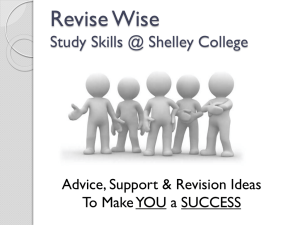Redesign text - Bangkok Patana School
advertisement
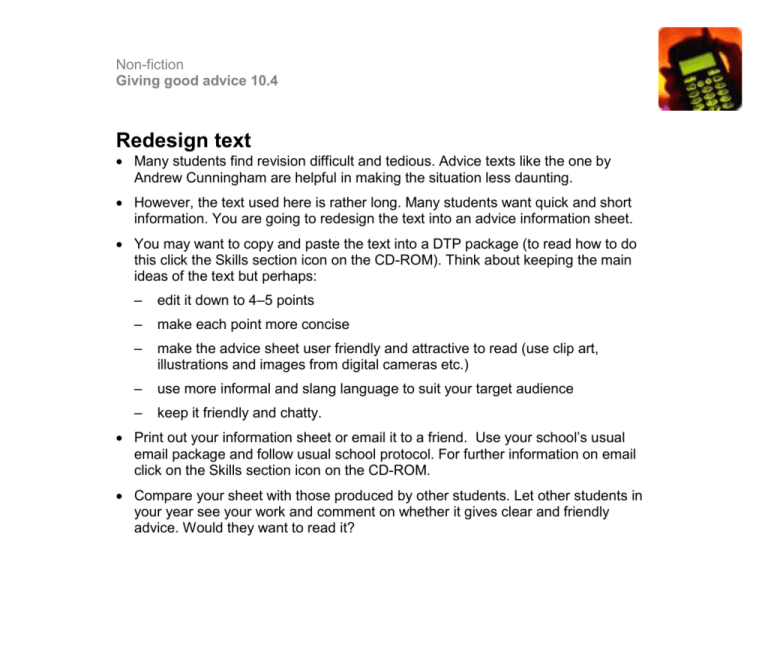
Non-fiction Giving good advice 10.4 Redesign text Many students find revision difficult and tedious. Advice texts like the one by Andrew Cunningham are helpful in making the situation less daunting. However, the text used here is rather long. Many students want quick and short information. You are going to redesign the text into an advice information sheet. You may want to copy and paste the text into a DTP package (to read how to do this click the Skills section icon on the CD-ROM). Think about keeping the main ideas of the text but perhaps: – edit it down to 4–5 points – make each point more concise – make the advice sheet user friendly and attractive to read (use clip art, illustrations and images from digital cameras etc.) – use more informal and slang language to suit your target audience – keep it friendly and chatty. Print out your information sheet or email it to a friend. Use your school’s usual email package and follow usual school protocol. For further information on email click on the Skills section icon on the CD-ROM. Compare your sheet with those produced by other students. Let other students in your year see your work and comment on whether it gives clear and friendly advice. Would they want to read it? Revision can be tough for teenagers but 10 simple steps can make life easier, says Andrew Cunningham GET READY FOR STRESS-FREE EXAMS The main revision period starts now, over the Easter holidays. As a teacher I have helped prepare hundreds of exam candidates. As a GCSE examiner, I have marked the scripts of many hundreds more. Whether they are GCSEs, A-levels or the new A/S-levels, exams bring pressure and stress. Here are 10 tips to ease that stress for teenagers facing them this summer: Be well prepared. At this stage, with so few weeks to go, it’s easier to slog than slacken. If no work is done now, with exam deadlines so tight, that horrible feeling of flat-out panic is sure to strike. By working steadily, you feel you have some control over the exams, rather than the other way round. 2 Spend time with others in the same boat. There’s nothing worse than people intent on a good time when you’re supposed to be swotting: they couldn’t care less about the pressures you face. 3 Forget the revision aids swamping the high street: badger your teachers instead. There are dozens of books, info-packs and CD-ROMs currently swamping the market; very few take account of a candidate’s unique personality or circumstances. Teachers are paid to help you through this tricky time: use them. Most will know your strengths and weaknesses; they will also, if they’re any good, be only too pleased to help. 4 Acknowledge the stress. Don’t bottle stress up, or pretend it doesn’t exist. It may be as well to remind parents how much holiday revision lies ahead, so they won’t ask you to run tom-fool errands when you should be working. By making sure friends and relatives know you’re facing exams, allowance will be made for the fact you will be on a shorter fuse than usual. 5 Technique is one of the most important tips for any exam candidate. Most teenagers comfortably grasp the idea that technique is all-important in sports such as football, cricket and tennis. Exams are no different. If you follow the common-sense skills: reading the question paper carefully, answering the question set, sticking to the question, dividing time properly between questions - you’ll have a much better chance of success. 6 Don’t score "own-goals". Few sportsmen/women would deliberately give the ball away to the opposition. Yet it’s amazing how many exam candidates do this by making avoidable mistakes in spelling, grammar and presentation. Think of such slips as giving the ball away to the examiner – and don’t do it. 7 Set realistic goals. Quality work is the key. You could spend the day "revising" and take little in. One hour of quality work is worth a desk-bound day gazing through the window. Set realistic revision targets, with short breaks in between. 8 Award yourself some carrots. The exam period can seem a bleak time for teenagers, with little to look forward to. That is why a "carrot" is essential to tempt you through the daily grind. It may be watching a television programme; it may even be a night out. But reward yourself when you’ve worked hard. 9 Be at your desk by 10 a.m. over the holidays. Starting revision at 2 p.m. is never an effective option. The morning is the best time to take in all those dates, facts, formulae and quotations. Three hours quality work between 10 and 1 may be all you need and could make a massive difference to your grades. 10 Pin this advice on your wall. 1 Andrew Cunningham is an English teacher at Cranleigh in Surrey. To close Word and return to the CD-ROM, click Close in the File menu.
